![Argentina. A Special Encounter Between Gen 3 and Scouts]()
8 Jan 2015 | Focolare Worldwide
 “I discovered that I can live the Scout Promise at every moment.” “It was very beautiful to spend time together and realize that we’re living for the same goal.” “Thanks to everyone who came to this truly unique afternoon.” “Thanks to everyone, a super-ingenious project, filled with smiles and teachings! We have to continue this.”
“I discovered that I can live the Scout Promise at every moment.” “It was very beautiful to spend time together and realize that we’re living for the same goal.” “Thanks to everyone who came to this truly unique afternoon.” “Thanks to everyone, a super-ingenious project, filled with smiles and teachings! We have to continue this.”
These are but a few on-the-spot impressions given by youngsters as the sun began to set on one of the public squares in the Argentine city of Bahia Blanca where Scouts and Gen 3 (teenagers of the Focolare Movement) had gathered for an afternoon of getting to know one another.
 But perhaps what best describes the joyful event was a message posted on the social network by Clarita, a teenager who is both a Scout and a Gen 3. With her brother, Juanfra, and her mother, Rose, she was one of the main promoters of the event. Clarita writes: “Finally, the dream happened! We put together two movements who use different methods to accomplish the same goal: to be “always ready” to ‘do to others as we would have them do to us.’ Happy, that’s the best word to describe how I feel.”
But perhaps what best describes the joyful event was a message posted on the social network by Clarita, a teenager who is both a Scout and a Gen 3. With her brother, Juanfra, and her mother, Rose, she was one of the main promoters of the event. Clarita writes: “Finally, the dream happened! We put together two movements who use different methods to accomplish the same goal: to be “always ready” to ‘do to others as we would have them do to us.’ Happy, that’s the best word to describe how I feel.”
The afternoon was an occasion for both Scouts and Gen 3 to learn, respect, be open and listen to others, but it was also an afternoon of many games, activities and laughter. Clarita continues: “Thank you to everyone who attended. I saw how the Gen 3 and the Scouts mix together so easily. Now my fellow Scouts know the Golden Rule, and will have another arrow in their bow to practice the Scout Law in their daily lives.” And the Gen 3 know the Scout’s motto: Be prepared, which will encourage their serving spirit.”
 This afternoon together was also an opportunity for the leaders of both movements. The Scout leaders responded to the proposal of doing something together, saying: “We put the adventure and the service, and you put the spirituality and the unity.” But, as time went by “us” and “you” gradually faded away, leaving all the space for “Us” where everyone felt actively involved in a single effort.
This afternoon together was also an opportunity for the leaders of both movements. The Scout leaders responded to the proposal of doing something together, saying: “We put the adventure and the service, and you put the spirituality and the unity.” But, as time went by “us” and “you” gradually faded away, leaving all the space for “Us” where everyone felt actively involved in a single effort.
As a memento of the event everyone received a bookmark. On one side was written: Do to others as you would have them do to you” and, on the other side, “Leave the world better than you found it.”
That afternoon will not remain an isolated event. Now the experience will continue through the creation of a “solidarity business” at the service of the community. The united world makes way when we are walking together!

7 Jan 2015 | Focolare Worldwide
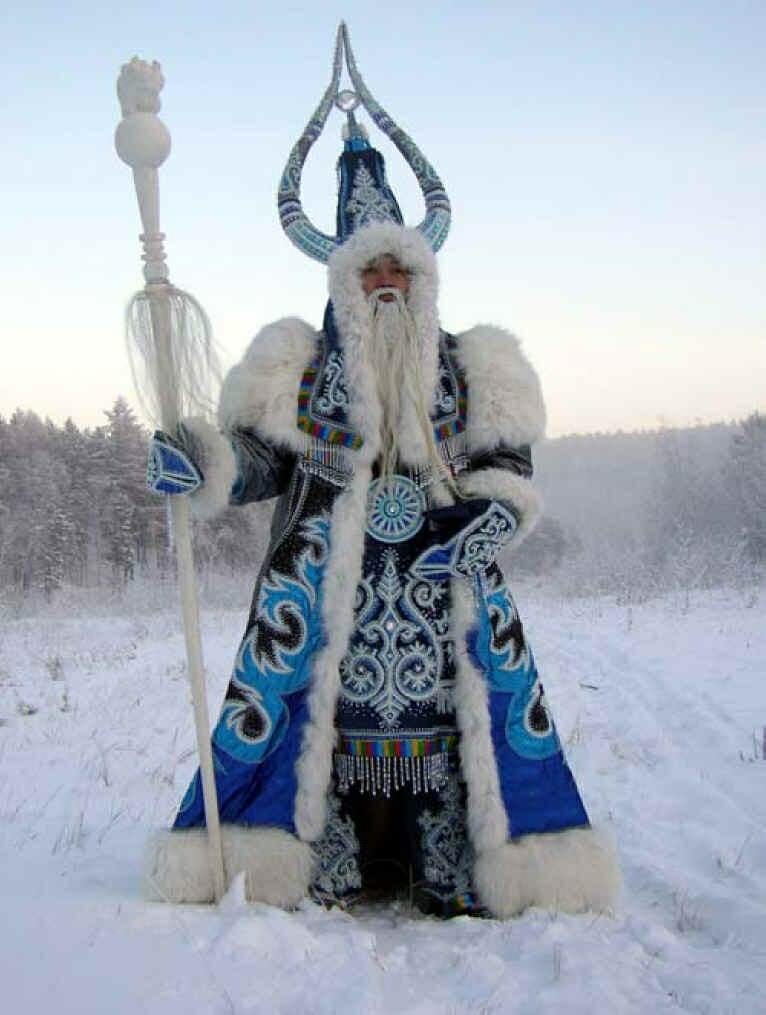 The Orthodox Christmas is celebrated on January 7th, nine months after the Annunciation to the Virgin Mary. This date corresponds to December 25 in the Julian calendar. The feast of Christmas is preceded by a period of fasting for 40 days, starting on November 27th.
The Orthodox Christmas is celebrated on January 7th, nine months after the Annunciation to the Virgin Mary. This date corresponds to December 25 in the Julian calendar. The feast of Christmas is preceded by a period of fasting for 40 days, starting on November 27th.
“For historical reasons – Sergei, an Orthodox focolarino from Moscow, tells us – after the revolution of 1917 and until the nineties, Christmas was no longer celebrated in Russia. In its place New Year celebrations were introduced, with the tree and Santa Claus, Ded Moroz in Russian, literally ‘Father Frost’.”
“I found out about Christmas and the whole ‘history of salvation’- continues Sergey – when I met the Focolare Movement. At that time I was not even baptized, so the meeting with the Focolare coincided, for me, with the encounter with God.”
According to custom, Christmas Eve is known by the name of “Sočelnik“, because of the food called sočivo, which consists of fruit and boiled corn, the only food allowed on that day. Fasting lasts until the evening, and is not broken until the Christmas hymn is sung. Then a candle is lit, symbolizing the star of Bethlehem, and this marks the end of the fast.”Despite these traditions, for many people in Russia – Sergei points out – Christmas still does not exist. Practically Jesus has been completely ‘exiled’ from their lives. Consumerism, so well known to the West, has also done its part, exploding with strength as soon as communism collapsed.”
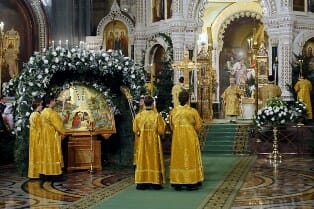 “That’s why we strive every day,” Sergey concludes, “so that as many people as possible can find this child, whose birth we celebrate these days. That they can see him ‘born among us’, through mutual love (Mt 18:20). My wish for this Christmas: that we Christians are capable of giving Jesus to the world, through our concrete evangelical love, and so bring him to everybody.
“That’s why we strive every day,” Sergey concludes, “so that as many people as possible can find this child, whose birth we celebrate these days. That they can see him ‘born among us’, through mutual love (Mt 18:20). My wish for this Christmas: that we Christians are capable of giving Jesus to the world, through our concrete evangelical love, and so bring him to everybody.
Merry Christmas! С РОЖДЕСТВОМ.
This is a greeting which we want to extend to our brothers and sisters of the Church in Serbia, the Coptic Church, the Church of Jerusalem, Macedonia, Ukraine, Georgia, and some Churches in Greece.”
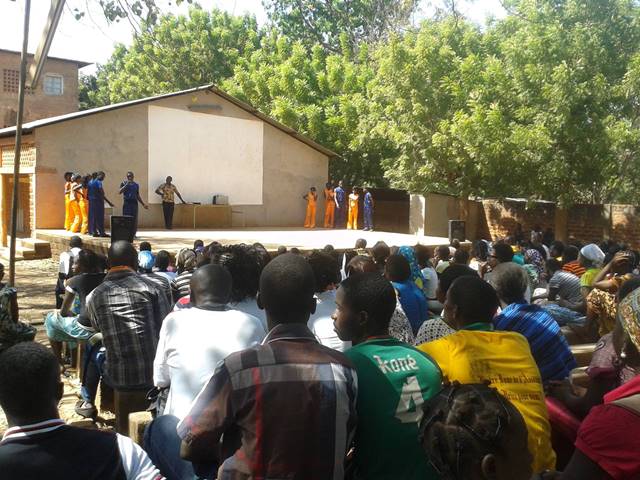
5 Jan 2015 | Focolare Worldwide
 “Mercy”, and that is forgiveness, which leads to peace, “for a new world”: this is the invitation to the youth of the diocese of Bobo-Dioulasso – the second largest city of the country – as a reflection for the coming year. Burkina Faso lives an important phase of transition, after the riots of last October, when the capital Ouagadougou had been hit by demonstrations of the opposition and civil society, so much so that there was talk of a ” Burkinabé Spring “.
“Mercy”, and that is forgiveness, which leads to peace, “for a new world”: this is the invitation to the youth of the diocese of Bobo-Dioulasso – the second largest city of the country – as a reflection for the coming year. Burkina Faso lives an important phase of transition, after the riots of last October, when the capital Ouagadougou had been hit by demonstrations of the opposition and civil society, so much so that there was talk of a ” Burkinabé Spring “.
And it is an experience of forgiveness that is offered by Fidèle during the day for young people on 7 December: while he was going around looking for work, he was convinced by a friend to pick some fruit from a tree for an old lady who was sick, thus arousing the anger of those who had misappropriated the tree. The story ends for Fidèle with a broken nose from a stick in the face. “The anger inside me grew as I pondered revenge. I was going home to treat the wound when I was approached by the boy who had hit me. He had his mother with him who was very upset. I did not want to give in, but then I remembered the words of the Gospel where Jesus says we must forgive 70 times 7 … The next day I bumped into him at the store and I greeted him first, showing that I had forgiven him. Since that day we became good friends.”
David and Laetitia, on behalf of the Youth for a United World of Bobo-Dioulasso, tell us about the initiative: “This year we decided to change our usual way of doing things in order to facilitate work with others. We got involved in coordinating the activities of the Youth Chaplaincy. Amazed by the previous experience of the Youth Festival, the leaders of the Chaplaincy asked us to organize a day of friendship among all the youth movements of the city, on the theme chosen for this year: “Young people, be merciful so as to build a new world. ‘”
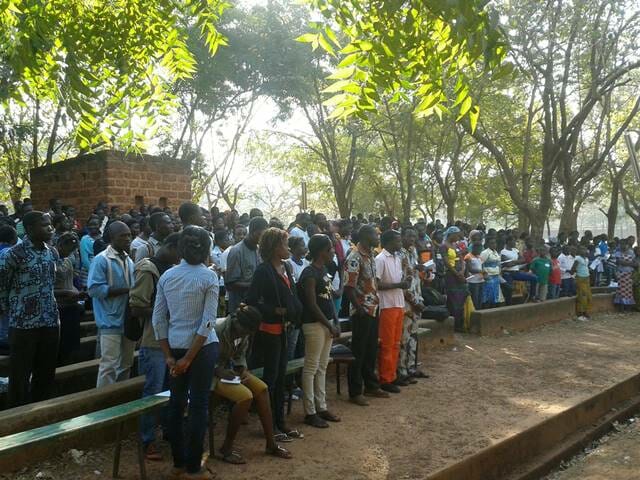 “The time was short,” they continue, “and the hardest thing was to work with people who have a different way of seeing things. The difficulties in agreeing things were not missing, especially when it got to drafting a program for the day; but our goal was primarily to establish unity among all, even at the expense of the quality of the organization. But the common desire to work together, to get to know each other, to have mutual esteem won out … And finally we got to the long awaited day. “
“The time was short,” they continue, “and the hardest thing was to work with people who have a different way of seeing things. The difficulties in agreeing things were not missing, especially when it got to drafting a program for the day; but our goal was primarily to establish unity among all, even at the expense of the quality of the organization. But the common desire to work together, to get to know each other, to have mutual esteem won out … And finally we got to the long awaited day. “
There were testimonies on forgiveness, including that of Fidèle, dancing, singing, “This day allowed us to get to know each other better. There have been many exchanges of contacts and we understood how the contribution of each one, however different, was necessary. We understood how the different movements are complementary and called to work together for the realization of unity, the same one that Jesus always teaches us. “
“This – they conclude – encourages us and gives us the desire to work together again. In a year’s time the next edition!”
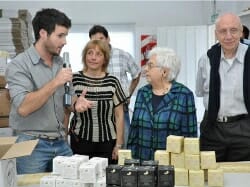
4 Jan 2015 | Focolare Worldwide
 Gonzalo Perrín would never have thought that at the age of 29 he would become a partner and manager of a biscuit factory. He was still taking up Hotel Catering sciences when he got to learn about the Economy of Communion (EoC), and was so deeply struck that he put aside his studies to put the ideals of the EoC concretely into practice. “n 2008 – he recounts – I gave up my job and returned to my country, and at O’Higgins I started to produce biscuits, at home to begin with, while I was setting up the factory and buying the suitable machines.” Today he runs “Pasticcino”, a factory that is part of the Solidaridad industrial park in the Argentinean little town of the Focolare, and where 2.5 million biscuits are produced yearly, distributed to 25 chains of bars and cafes. He is currently considering the possibility of opening a branch in Brazil, at Spartaco, the EoC hub of the Focolare centre close to São Paulo.
Gonzalo Perrín would never have thought that at the age of 29 he would become a partner and manager of a biscuit factory. He was still taking up Hotel Catering sciences when he got to learn about the Economy of Communion (EoC), and was so deeply struck that he put aside his studies to put the ideals of the EoC concretely into practice. “n 2008 – he recounts – I gave up my job and returned to my country, and at O’Higgins I started to produce biscuits, at home to begin with, while I was setting up the factory and buying the suitable machines.” Today he runs “Pasticcino”, a factory that is part of the Solidaridad industrial park in the Argentinean little town of the Focolare, and where 2.5 million biscuits are produced yearly, distributed to 25 chains of bars and cafes. He is currently considering the possibility of opening a branch in Brazil, at Spartaco, the EoC hub of the Focolare centre close to São Paulo.
To keep in line with the spirit of the EoC and share the company’s profits with the poor, Gonzalo even got to the point of asking the banks for a loan. Another particular experience is that among the staff of the “Pasticcino” there is a visually-impaired employee, Charley. During a visit, some pointed out to Gonzalo that Charley was an extra expense for the company: “In fact, it may seem a bit costly,” he replied, “but what you don’t see on the balance sheet is that he represents a great asset for the company because of the ideas he proposes, and for the good atmosphere his presence imbues among the colleagues.” In fact, today Gonzalo considers Charley not only as an employee, but more as a consultant and friend.
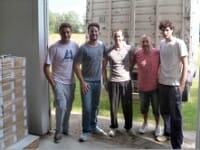 To those who asked if this was all worthwhile, and if he did not wish to earn more, he answered: “At times when I get into a friend’s car, I say to myself: what a great car! But I myself have never been in need of anything and the important things in life are relationships, which are things money cannot buy. I don’t know how long the company will last, but if it doesn’t, the relationships will remain, and these are the most precious things I possess.”
To those who asked if this was all worthwhile, and if he did not wish to earn more, he answered: “At times when I get into a friend’s car, I say to myself: what a great car! But I myself have never been in need of anything and the important things in life are relationships, which are things money cannot buy. I don’t know how long the company will last, but if it doesn’t, the relationships will remain, and these are the most precious things I possess.”
Recently, Gonzalo had to conclude a big business deal with a new client: “We have already met five times. Ten days ago I attended the sixth and it seemed like things were really moving ahead. But since then I have passed my time looking at the telephone and waiting for it to ring. I was going crazy, when, during my dad’s birthday, my grandma who is 82, asked me how the company was faring. I told her all the details of this new business and she answered: “Don’t’ worry Gonzalo, if this new deal with that company doesn’t pull through, it will be for the better.” I don’t know how, but with those words, my worries vanished somewhat.”
After a few days it was grandma’s birthday and “precisely on that day the client I was talking about accepted me as his supplier!” The Pasticcino factory is expanding!
![Argentina. A Special Encounter Between Gen 3 and Scouts]()
1 Jan 2015 | Focolare Worldwide
 “Today, due to an ever-increasing number of interconnections in today’s world that has made society powerfully aware of the common destiny of nations, slavery, an offence against human rights, has formally been abolished in the world. The right of every person to be free from slavery or oppression has been recognized in international human rights as an irrevocable norm. And yet, despite the fact that the international community has adopted numerous agreements to put an end to slavery in all its forms and undertaken various strategies to combat this phenomenon, still today millions of people – children, men and women of all ages – are deprived of freedom and forced to live in conditions similar to that of slavery,» Pope Francis wrote in his message for the World Day of Peace, celebrated on 1 January, feast of the family.
“Today, due to an ever-increasing number of interconnections in today’s world that has made society powerfully aware of the common destiny of nations, slavery, an offence against human rights, has formally been abolished in the world. The right of every person to be free from slavery or oppression has been recognized in international human rights as an irrevocable norm. And yet, despite the fact that the international community has adopted numerous agreements to put an end to slavery in all its forms and undertaken various strategies to combat this phenomenon, still today millions of people – children, men and women of all ages – are deprived of freedom and forced to live in conditions similar to that of slavery,» Pope Francis wrote in his message for the World Day of Peace, celebrated on 1 January, feast of the family.
And as he writes, he remembers all «the many men and women workers, also minors, who are enslaved in different sectors,» and also recalls “the living conditions of many migrants who suffer hunger, and are deprived of liberty, stripped of their possessions or physically and sexually abused. My thoughts go to those who are dominated by fear and insecurity upon reaching their destination after a difficult journey, and are at times detained in inhuman conditions.”
Mohamed comes from Mali and has passed through a shipwreck and a life of poverty and suffering. Today, he strongly desires to express his gratitude. This what Flavia Cerino, a lawyer, tells New City. “When he was just fifteen years old, Mohamed decided to leave: a long journey through the desert in Libya (prisons and abuse) and then, finally, Italy. The Mare Nostrum operations saved him from the shipwreck but on touching ground, he was immediately handcuffed: his co-travellers had identified him as one of those engaged in the human trafficking business, but in reality he was not involved. In fact, he had distributed some food and drinks on the boat because the real traffickers had threatened to throw him overboard if he did not do so. Since he was just an adolescent he was not sent to a real jail. The long wait for the hearing which would confirm his arrest, took place in a small and cramped room in the city Court, but many people were there to take care of him: the policemen were kind and the social workers took interest in his life, health, and family. For months nobody had given him so much attention. Usually he only received commands, not questions. And then, since one of the policemen spoke French, and he was able to thoroughly explain the real facts.”
The hearing to confirm his arrest ended well: he would be assigned to service in the community, and not to jail.
“He will not be free, but it was undoubtedly better than jail. The structure was pleasant, in a small sunny town further south. Mohamed managed to gain the respect and affection of all: he was always willing to help in the housework, ready to learn new words in Italian, loved soccer but also silence and solitude. After some months, the time came for him to appear before the Court: for him this meant a return to the past, the brutal experiences he wished to forget. Though time had passed, his memories were still there, also the beautiful ones. And at the end of the hearing, he had only one wish: to return to the last floor in those dark and gloomy rooms, only to say thanks to that policeman who spoke French and those kind social workers. He would remember them forever. Unfortunately, none of these people he knew were on duty. But his ‘thanks’, quite a rare event, will be passed on to them by their colleagues.”
“We know that God will ask each of us: “What have you done to your brother?» – Pope Francis concludes. “The globalisation of indifference weighs on the lives of many of our brothers and sisters, and calls out to us to become the architects of a globalisation of solidarity that can give them hope and new courage to undertake the journey through our time and bring along with them new prospects, a task which God has entrusted to us.”
29 Dec 2014 | Focolare Worldwide
 “I discovered that I can live the Scout Promise at every moment.” “It was very beautiful to spend time together and realize that we’re living for the same goal.” “Thanks to everyone who came to this truly unique afternoon.” “Thanks to everyone, a super-ingenious project, filled with smiles and teachings! We have to continue this.”
“I discovered that I can live the Scout Promise at every moment.” “It was very beautiful to spend time together and realize that we’re living for the same goal.” “Thanks to everyone who came to this truly unique afternoon.” “Thanks to everyone, a super-ingenious project, filled with smiles and teachings! We have to continue this.” But perhaps what best describes the joyful event was a message posted on the social network by Clarita, a teenager who is both a Scout and a Gen 3. With her brother, Juanfra, and her mother, Rose, she was one of the main promoters of the event. Clarita writes: “Finally, the dream happened! We put together two movements who use different methods to accomplish the same goal: to be “always ready” to ‘do to others as we would have them do to us.’ Happy, that’s the best word to describe how I feel.”
But perhaps what best describes the joyful event was a message posted on the social network by Clarita, a teenager who is both a Scout and a Gen 3. With her brother, Juanfra, and her mother, Rose, she was one of the main promoters of the event. Clarita writes: “Finally, the dream happened! We put together two movements who use different methods to accomplish the same goal: to be “always ready” to ‘do to others as we would have them do to us.’ Happy, that’s the best word to describe how I feel.” This afternoon together was also an opportunity for the leaders of both movements. The Scout leaders responded to the proposal of doing something together, saying: “We put the adventure and the service, and you put the spirituality and the unity.” But, as time went by “us” and “you” gradually faded away, leaving all the space for “Us” where everyone felt actively involved in a single effort.
This afternoon together was also an opportunity for the leaders of both movements. The Scout leaders responded to the proposal of doing something together, saying: “We put the adventure and the service, and you put the spirituality and the unity.” But, as time went by “us” and “you” gradually faded away, leaving all the space for “Us” where everyone felt actively involved in a single effort.







